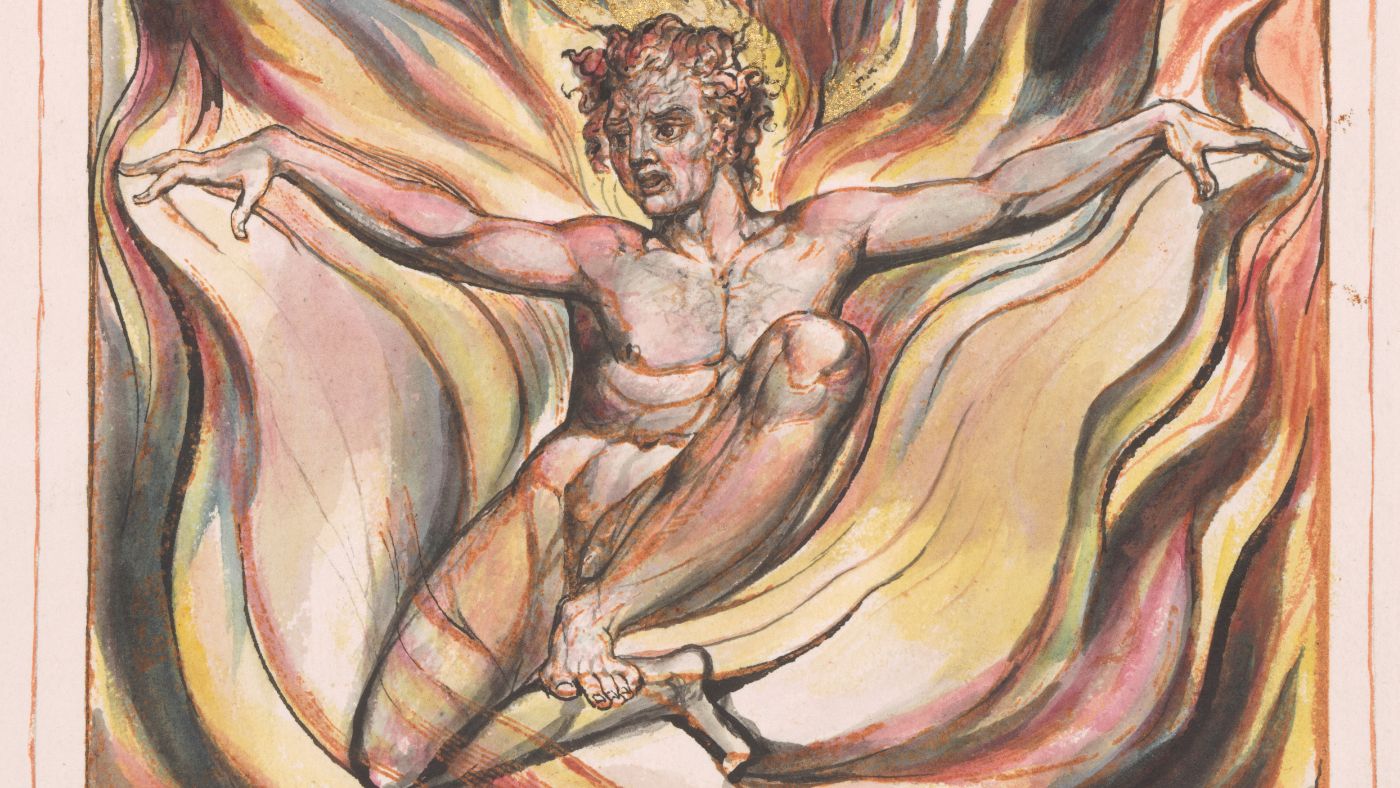William Blake's Universe: 'conventional' and 'befuddling' artwork
First exhibition to explore the eccentric figure's imagination in the context of trends and themes in art

A free daily email with the biggest news stories of the day – and the best features from TheWeek.com
You are now subscribed
Your newsletter sign-up was successful
We tend to think of William Blake (1757-1827) as a quintessentially English kind of eccentric, said Nicholas Wroe in The Guardian. Thanks in part to his words for the hymn Jerusalem, the "idiosyncratic" poet and artist is remembered as a "determinedly Anglocentric" thinker: he never left England, and rarely strayed further afield than the boundaries of London. Yet, as the curators of this new exhibition at Cambridge's Fitzwilliam Museum argue, Blake was perhaps not the isolated genius of legend. The show attempts to reframe its subject in the context of the wider artistic currents that swept across the continent during his lifetime, notably romanticism.
While Blake himself provides around half of the 180 paintings, drawings and prints on display, the rest come courtesy of his "peers, mentors and followers", said Katy Prickett on BBC News. William Blake's Universe features important works by his British contemporaries such as Samuel Palmer, and the German Romantic painters Caspar David Friedrich and Philipp Otto Runge. As a whole, it promises to provide a fresh interpretation of Blake's "radical" vision.
Blake was undoubtedly "one of the greatest poets in the English language", said Jonathan Jones in The Guardian. Yet seen purely as an artist, he suffers by comparison with the other painters here – some of whose inclusion seems tenuous at best. Blake probably wasn't even aware of Runge and Friedrich, whose work here far outshines his own: the former fields an "exquisitely classical and totally psychotic" drawing of a possessed boy with "blank spheres" for eyes; while a series of "climactic" sepia drawings by Friedrich brim with wild, romantic imagery, from "the ruins of a monastery framed against the stark sky" to "skeletons in a cave swarming with stalactites". Blake, by contrast, seems rather conventional and outclassed.
The Week
Escape your echo chamber. Get the facts behind the news, plus analysis from multiple perspectives.

Sign up for The Week's Free Newsletters
From our morning news briefing to a weekly Good News Newsletter, get the best of The Week delivered directly to your inbox.
From our morning news briefing to a weekly Good News Newsletter, get the best of The Week delivered directly to your inbox.
"At points, the exhibition seems wilfully befuddling and esoteric," said Alastair Sooke in The Daily Telegraph. Yet confusing as it can be, it succeeds in evoking the spirit of Blake's age. Like many of his contemporaries, he was "preoccupied by the French Revolution", and like some of them, he believed he was living through "the end times". This partially explains the "sense of apocalypse" that "saturates" his art, and may well have inspired some of the "sinister, manacled figures" and "celestial creatures wreathed in frames" that we see here. Blake still emerges as an "unclassifiable" original: his work is full of "inimitable, phantasmagorical images", from "coiled serpents and gigantic spiders scuttling across cobwebs" to "musclebound sylphs moving in sync, as if dancing the cha-cha-cha". For all its opacity, this is an admirable show that demonstrates "why its subject still matters". Indeed, "it makes Blake's profound oddness seem, if anything, even odder".
Fitzwilliam Museum, Cambridge; fitzmuseum.cam.ac.uk. Until 19 May
A free daily email with the biggest news stories of the day – and the best features from TheWeek.com
-
 Bonfire of the Murdochs: an ‘utterly gripping’ book
Bonfire of the Murdochs: an ‘utterly gripping’ bookThe Week Recommends Gabriel Sherman examines Rupert Murdoch’s ‘war of succession’ over his media empire
-
 Gwen John: Strange Beauties – a ‘superb’ retrospective
Gwen John: Strange Beauties – a ‘superb’ retrospectiveThe Week Recommends ‘Daunting’ show at the National Museum Cardiff plunges viewers into the Welsh artist’s ‘spiritual, austere existence’
-
 Should the EU and UK join Trump’s board of peace?
Should the EU and UK join Trump’s board of peace?Today's Big Question After rushing to praise the initiative European leaders are now alarmed
-
 Bonfire of the Murdochs: an ‘utterly gripping’ book
Bonfire of the Murdochs: an ‘utterly gripping’ bookThe Week Recommends Gabriel Sherman examines Rupert Murdoch’s ‘war of succession’ over his media empire
-
 Gwen John: Strange Beauties – a ‘superb’ retrospective
Gwen John: Strange Beauties – a ‘superb’ retrospectiveThe Week Recommends ‘Daunting’ show at the National Museum Cardiff plunges viewers into the Welsh artist’s ‘spiritual, austere existence’
-
 Bad Bunny’s Super Bowl: A win for unity
Bad Bunny’s Super Bowl: A win for unityFeature The global superstar's halftime show was a celebration for everyone to enjoy
-
 Book reviews: ‘Bonfire of the Murdochs’ and ‘The Typewriter and the Guillotine’
Book reviews: ‘Bonfire of the Murdochs’ and ‘The Typewriter and the Guillotine’Feature New insights into the Murdoch family’s turmoil and a renowned journalist’s time in pre-World War II Paris
-
 6 exquisite homes with vast acreage
6 exquisite homes with vast acreageFeature Featuring an off-the-grid contemporary home in New Mexico and lakefront farmhouse in Massachusetts
-
 Film reviews: ‘Wuthering Heights,’ ‘Good Luck, Have Fun, Don’t Die,’ and ‘Sirat’
Film reviews: ‘Wuthering Heights,’ ‘Good Luck, Have Fun, Don’t Die,’ and ‘Sirat’Feature An inconvenient love torments a would-be couple, a gonzo time traveler seeks to save humanity from AI, and a father’s desperate search goes deeply sideways
-
 A thrilling foodie city in northern Japan
A thrilling foodie city in northern JapanThe Week Recommends The food scene here is ‘unspoilt’ and ‘fun’
-
 Tourangelle-style pork with prunes recipe
Tourangelle-style pork with prunes recipeThe Week Recommends This traditional, rustic dish is a French classic